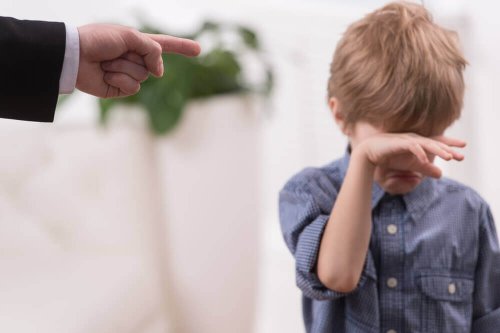Guilt is an Internal Fear of Punishment

Guilt is a very unpleasant feeling. Every step of the way you have that insecurity, that fear always comes back to you.
But where did this guilt come from? Is guilt an internal fear of punishment?
It’s important that you look to the past at your childhood, the age when the majority of your traumas and fears were formed. How did your parents treat you? What kind of reinforcement did they give you? Did you receive an education that was based on fear?
Although you probably don’t think too much about the education you received from your parents, the way they treated you can make guilty feelings an essential part of your adult life.
Let’s see how all this happens.
See:
10 Values to Teach Your Children
An internal fear of punishment

There are other types of punishment that hurt more and leave deep emotional wounds, which can open up during adulthood.
One type of punishment is the silent treatment. In the silent treatment, suddenly, a child isn’t able to interact with their parents. They talk, but no one responds. This can make them feel lonely, abandoned, and afraid. But above all, they feel guilty.
Another type of punishment is a disproportionate reaction from a parent who say things like “Why have you done this to me?” Or “You don’t deserve this.” All of this generates feelings of guilt that the child will internalize.
Every word you say as a parent and every attitude you have toward your children can cause feelings of guilt that later cause problems when the children grow up.
Once you’ve identified their origin, however, these types of feelings can be resolved and eliminated. It’s not easy, but it is possible.
Discover:
Mistakes Parents Make when Their Children Disobey Them
What do you feel guilty about?

- I feel guilty that my friend gets mad at me if I don’t do what they want or think about things differently.
- I feel guilty if a loved one doesn’t suddenly answer a message. I assume I’ve said something offensive or they’re angry with me (without there being any reason for those assumptions).
- I feel guilty for feeling guilty. I think I’m not worthy, I don’t deserve anything, and I’m inferior to other people.
See:
As you can see, feeling guilty and having low self-esteem are two concepts that go almost hand-in-hand. You can see insecurity in many of these examples, along with a low tolerance for frustration and a fear of abandonment.
The last one is most curious: “I feel guilty for feeling guilty.”
This is more common than it seems, however. People who feel guilty about everything can go through extremes like this.
Stop feeling guilt

Then, you need to find out in which context guilt typically emerges from. Is it a fear that someone will be angry with you? Is it when someone doesn’t respect your opinion? This can give you an idea of how much the situations resemble past episodes from your childhood that were the origin of your guilt at the time.
The last thing you need to do is be aware of this. Don’t blame your parents (if that’s the case). Instead, take responsibility for your guilt and work to manage your emotions.
Every time that feeling comes up, ask it why it’s there. Most of the time, you’ll find that you have no reason to feel guilty, and sometimes you may even anticipate things that haven’t even happened yet when feeling guilty. Either way, learning to overcome your guilt is important to help you live a happier life.
Are you read to stop feeling guilty?
All cited sources were thoroughly reviewed by our team to ensure their quality, reliability, currency, and validity. The bibliography of this article was considered reliable and of academic or scientific accuracy.
-
Hamilton, A. (2008). Feeling good about feeling guilty. Eureka street, 18(4), 3-4.
-
Nelissen, R. M. (2012). Guilt-induced self-punishment as a sign of remorse. Social Psychological and Personality Science, 3(2), 139-144.
-
Inbar, Y., Pizarro, D. A., Gilovich, T., & Ariely, D. (2013). Moral masochism: On the connection between guilt and self-punishment. Emotion, 13(1), 14.
This text is provided for informational purposes only and does not replace consultation with a professional. If in doubt, consult your specialist.








